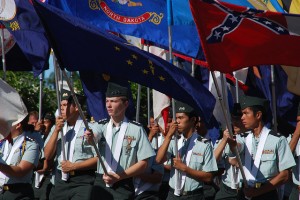 The U.S. military’s policy barring openly gay men and women from serving expires this morning. Known as “don’t ask, don’t tell,” the prohibition has been in place since 1993.
The U.S. military’s policy barring openly gay men and women from serving expires this morning. Known as “don’t ask, don’t tell,” the prohibition has been in place since 1993.
The repeal of the law has far-reaching effects not only for the military but also on the Reserve Officers’ Training Corps (ROTC) on college campuses. In recent years, some ROTC units have left public colleges rather than admit openly gay students.
But ROTC’s acceptance of openly gay men and women may not have a large impact on enrollment, says Jennifer Miracle, the associate director of intercultural affairs for the LGBT Resource Center at the University of Georgia.
“I do know [gay and lesbian students] involved in ROTC, mostly women,” Miracle said. “In the past, they have been afraid to come to our office. I do hope that will change, but there are still many barriers for students coming out, not just this.”
Miracle went on to say that in the South, especially, students face family and religious pressures that make it hard for someone to come out, regardless of whether there is a don’t ask, don’t tell policy.
Miracle however, is still excited about the repeal.
“It’s wonderful,” Miracle said, “but I think it is also unfortunate that it has taken this long. It would be great to say it is no longer an issue, but that’s just not the case. There will continue to be struggles and the cultural changes ahead will be difficult. These will take a long time. But, yes, it is exciting to see progress; it has been a long time coming.”
One Air Force ROTC cadet who spoke on the condition of anonymity said that, despite the repeal, she did not intend to come out.
"I will answer anyone who questions me but I will not personally reveal that information about myself," the cadet said in an email interview.
For a time she reconsidered joining ROTC and the Air Force because of don't ask, don't tell. But, she said, her childhood dream of joining the Air Force won out in the end.
Thanks to the repeal, she said, "I feel happier that I will be able to have the career I want and will be able to share it with someone I truly care about."
Despite the historic progress made by the repeal there are some in the LGBT community who still cannot serve, either in ROTC or on active duty. Transgender persons are excluded not because of don’t ask, don’t tell but because of a clause in the military’s medical policy that says they have gender identity disorder and are therefore unfit for service. The "Standards of Medical Fitness" classifies this as "administratively unfit rather than medically unfit."
Wyatt George, an 18-year-old transgender student at Kennesaw State University, wanted to join the Air Force ROTC and eventually the Air Force.
“When I found out about [the Air Force’s] policies regarding transgender issues,” George said, “it was like, that’s not really a possibility for me. You have to go through various physical examinations and if they find anything has been altered it’s pretty much grounds for dishonorable discharge.”
George went on to say that, should that policy be changed in the future, he would still be interested in joining the Air Force.
It is important to note that the repeal of don’t ask, don’t tell only affects college ROTC programs. High school JROTC programs have always allowed openly gay members because JROTC is not considered a military recruiting tool.